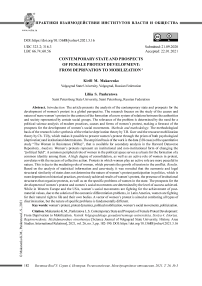Contemporary state and prospects of female protest development: from deprivation to mobilization
Автор: Makarenko Kirill M., Pankratova Liliia S.
Журнал: Вестник ВолГУ. Серия: История. Регионоведение. Международные отношения @hfrir-jvolsu
Рубрика: Практики взаимодействия институтов власти и общества в России
Статья в выпуске: 3 т.26, 2021 года.
Бесплатный доступ
Introduction. The article presents the analysis of the сontemporary state and prospects for the development of women’s protest in a global perspective. The research focuses on the study of the causes and nature of mass women’s protest in the context of the formation of a new system of relations between the authorities and society represented by certain social groups. The relevance of the problem is determined by the need for a political science analysis of modern practices, causes and forms of women’s protest, making a forecast of the prospects for the development of women’s social movements. Methods and methodology. The methodological basis of the research is the synthesis of the relative deprivation theory by T.R. Gurr and the resource mobilization theory by Ch. Tilly, which makes it possible to present women’s protest through the prism of both psychological (deprivation) and institutional determinants. The empirical basis of the work is the data (338 cases) of the quantitative study “The Women in Resistance (WiRe)”, that is available for secondary analysis in the Harvard Dataverse Repository. Analysis. Women’s protests represent an institutional and non-institutional form of changing the “political field”. A common peripheral role of women in the political space serves as a basis for the formation of a common identity among them. A high degree of consolidation, as well as an active role of women in protest, correlates with the success of collective action. Protests in which women play an active role are more peaceful in nature. This is due to the mediating role of women, which prevents the growth of tension in the conflict. Results. Based on the analysis of statistical information and case-study, it was revealed that the economic and legal structural similarity of states does not determine the nature of women’s protest participation in politics, which is more dependent on historical practices, previously achieved results of women’s protest, the presence of institutional structures that organize protests, as well as on the specific problems of women in the state. The prospects for the development of women’s protest and women’s social movements are determined by the level of success achieved. While in Western Europe and the USA, women’s social movements are fighting for the achievement of post- material values, due to the solution of the economic differentiation problems, in Latin America, women are fighting for their natural right to life and their own bodies. A vector of women’s protest is aimed at combating all types of discrimination, but the nature of specific problems is fundamentally different.
Women's protest, protest dynamics, political mobilization, women's social movements, politicization
Короткий адрес: https://sciup.org/149137987
IDR: 149137987 | УДК: 323.2, | DOI: 10.15688/jvolsu4.2021.3.16
Список литературы Contemporary state and prospects of female protest development: from deprivation to mobilization
- Baldez L. Why Women Protest: Women's Movements in Chile. Cambridge, Cambridge University Press, 2002. 227 p.
- Bell S.R., Murdie A., Peksen D. Globalization and Contentious Politics: Predicting Women's and Non-Women's Protest, 2017. URL: http://www. amandamurdie.org/uploads/3/4/3/2/34329007/bell_ murdie_peksen_2017.pdf (accessed 29 December 2020).
- Calavatra A., Rey D. International Women's Day: Strikes, Protests and Holidays. AP News. March 9, 2019. URL: https://apnews.com/35cb80ff96cb410 baf875c07f9d96c67 (accessed 2 September 2020).
- Chenoweth E. "WiRe Dataset, v1.xls", Women in Resistance Dataset, version 1. Harvard Dataverse, V3. 2019. URL: https://doi.org/10.7910/ DVN/BYFJ3Z/6AURFD (accessed 2 September 2020).
- Filippova Ye.L. «Politizatsiya» vs «depolitizatsiya»: poisk al'ternativnykh strategicheskikh proyektov i vozmozhnosti strukturirovaniya politicheskogo polya ["Politicization" vs "Depoliticization": The Search for Alternative Strategic Projects and Possibilities of Political Field Structuring]. Politicheskaya nauka [Political Science], 2018, no. 2, pp. 95-115.
- Gurr T.R. Pochemu lyudi buntuyut [Why Men Rebel]. Saint Petersburg, Piter Publ., 2005. 461 p.
- Huge Protests in Latin America on International Women's Day. France 24. March 9, 2020. URL: https://www.france24.com/en/20200309-huge-protests-in-latin-america-on-international-women-s-day (accessed 2 September 2020).
- «Lukashenko nas sil'no nedootsenil». Kak zhenshchiny v Belorussii stali moshchnoy siloy protestnogo dvizheniya ["Lukashenko Greatly Underestimated Us" How Women in Belarus Became a Powerful Force of the Protest Movement]. Lenta. ru. URL: https://lenta. ru/articles/2020/08/22/belwomen/ (accessed 2 September 2020).
- McGovan C. "Our Role is Central": More than 1m Chilean Women to March in Huge Protest. The Guardian. 6 March 2020. URL: https://www. theguardian.com/world/2020/mar/06/chile-womens-day-protest (accessed 3 September 2020).
- Mexican Women Strike to Protest Against Gender-Based Violence. BBC News. 9 March 2020. URL: https://www.bbc.com/news/world-latin-america-51811040 (accessed 2 September 2020).
- Murdie A., Peksen D. Women and Contentious Politics: A Global Event-Data Approach to Understanding Women's Protest. Political Research Quarterly, 2015, vol. 68 (1), pp. 180-192.
- Ortiz-Ospina E. Economic Inequality by Gender. 2018. URL: https://ourworldindata.org/economic-inequality-by-gender (accessed 29 August 2020).
- Posledniye dannyye po protestam v Belorussii. Statistika i khronika protivostoyaniya [The Latest Data on Protests in Belarus. Statistics and Chronicle of the Confrontation]. Kommersant. URL: https://www.kommersant.ru/doc/4451480#id1932303 (accessed 2 September 2020).
- Puglice N. How these Six Women's Protests Changed History. The Guardian. January, 21 2017. URL: https://www.theguardian.com/world/2017/jan/21/ womens-march-protests-history-suffragettes-iceland-poland (accessed 29 August 2020).
- Roser M. Human Rights. 2016. URL: https:// ourworldindata.org/human-rights (accessed 29 August 2020).
- Safa H. I. Women's Social Movements in Latin America. Gender and Society, 1990, vol. 4, no. 3, pp. 354-369.
- Rogova K., ed. Vstrechnaya mobilizatsiya. Moskovskiye protesty i regional'nyye vybory -2019: analiticheskiy doklad. Seriya «Liberal'naya missiya - Ekspertiza». Vyp. 7 [Counter Mobilization. Moscow Protests and Regional Elections - 2019. Analytical Report. Series "Liberal Mission -Expertise". Iss. 7]. Moscow, Fond "Liberal'naya missiya", 2019. 110 p.
- Wilson C., Zabaneh J., Dore-Weeks R. Understanding the Role of Women and Feminist Actors in Lebanon's 2019 Protests. UN Women, 2019. 17 p.


